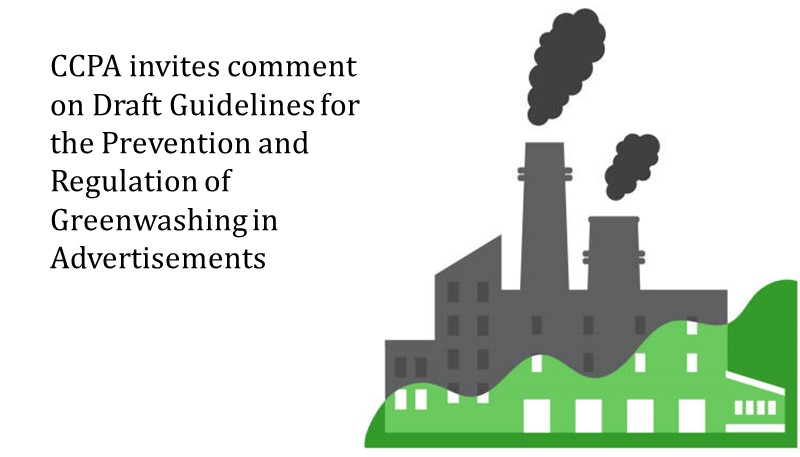CCPA invites comment on Draft Guidelines for the Prevention and Regulation of Greenwashing in Advertisements

The Central Consumer Protection Authority (“CCPA”) has invited comments on the draft ‘Guidelines for the Prevention and Regulation of Greenwashing, 2024’ (“Draft Guidelines”) by 21st March 2024. These guidelines aim to prevent and regulate Greenwashing* which has been defined to include unsubstantiated environmental claims and emphasizing positive environmental aspects without disclosing the harmful attributes.
The views/comments/suggestions on the proposed Guidelines may be sent by mail to com-ccpa@gov.in.
Key Highlights:
The key highlights of the Draft Guidelines are as follows:
1. Applicability:
The Draft Guidelines is applicable to (a) all advertisements irrespective to their form, format or medium; (b) a service provider, product seller, advertiser or an advertising agency or endorser who is providing service for the advertisement of such goods or services. But these guidelines are not applicable to advertisements or communication not particularly related to any product or services unless such advertisement or communication is directly or indirectly related to any product or service.
2. Norms for using generic terms for environmental claims:
For all advertisements which make environmental claims (i.e., suggesting environment-friendly attributes), generic terms like ‘clean’, ‘green’, ‘eco-friendly’, ‘eco-consciousness’, ‘good for the planet’, ‘minimal impact’, ‘cruelty-free’, ‘carbon-neutral’ and similar assertions can be used only after obtaining adequate qualifiers and substantiation and adequate disclosure. The Draft Guidelines states that while using technical terms like Environment Impact Assessment (EIA), Greenhouse Gas Emissions, Ecological Footprint, advertisers must use consumer friendly language and provide explanation to the meaning or implication of such terms. All the environmental claims must be supported by verifiable evidence.
3. Adequate disclosure:
The Draft Guidelines states that ‘environment related claims’ to qualify as environment friendly, the disclosure has to be in the following manner:
a. Must be accurate and disclose all material information either by advertisement or communication.
b. Data from research must not be cherry picked so as to highlight only the favorable observation while hiding the unfavorable.
c. Specify whether it refers to the good, manufacturing process, packaging, manner of use of the good or its disposal or service or process of rendering service.
d. Must be easily accessible to the consumer and not contradictory to the claim.
e. For ‘comparative environment claims’ where there is comparison of one product or service to another (a) the disclosure has to be based on verifiable and relevant data and (b) must disclose the aspects which are being compared.
f. For ‘specific environmental claims’ like sustainable claims, refillable, renewable and similar assertions; the disclosure has to be supported by credible certification, reliable scientific evidence or independent third-party verification.
4. Penalty:
Any contravention of the Draft Guidelines will attract provisions of this Consumer Protection Act 2019.
5. Guidance Note to help the industry comply with the Guidelines:
Further, the CCPA has issued Guidance Note which states when making environment claims following must be taken into account : –
a. Truthfulness and accuracy
b. Clarity and ambiguity
c. Fairness and meaningful comparison
d. Claims to be absolute and relevant
e. Images to be used without substantive changes.
A copy of the Draft is attached for your ease of reference.
Source: Central Consumer Protection Authority
——————————————
**Section 2(e)-“Greenwashing” means-
- any deceptive or misleading practice, which includes concealing, omitting, or hiding relevant information, by exaggerating, making vague, false, or unsubstantiated environmental claims.
- use of misleading words, symbols, or imagery, placing emphasis on positive environmental aspects while downplaying or concealing harmful attributes.
**Section 2(f)- “Environmental claims’ means: any representation, in any form, regarding:
- a good (either in its entirety or as a component), the manufacturing process, packaging, the manner of use of the good, or its disposal;
- a service (or any portion thereof) or the process involved in providing the service, Suggesting environment-friendly attributes.
Explanation – It may include, but not limited to:
- having a neutral or positive impact on the environment or contributing to sustainability;
- causing less harm to the environment compared to a previous version of the same product or service;
- causing less harm to the environment than competing goods or services;
- being more beneficial to the environment or possessing specific environmental advantages;
all aimed at conveying a sense of environmental responsibility or eco-friendliness associated with the good or service.